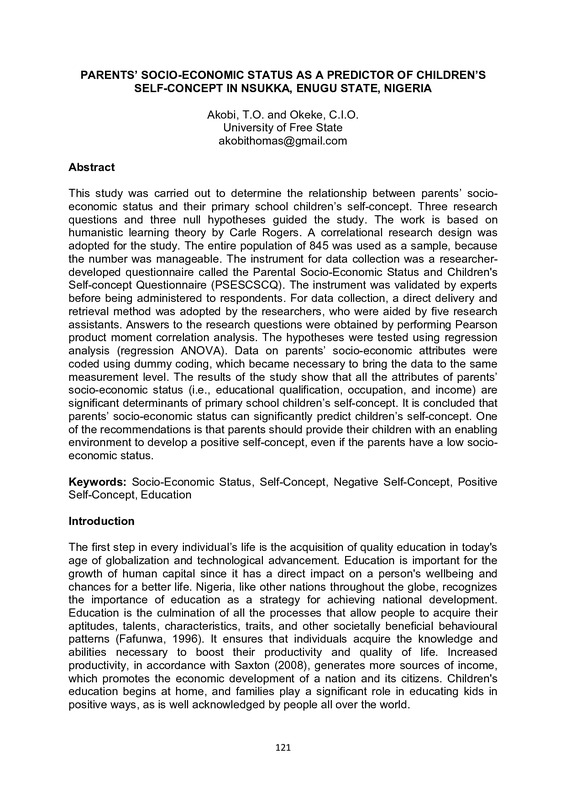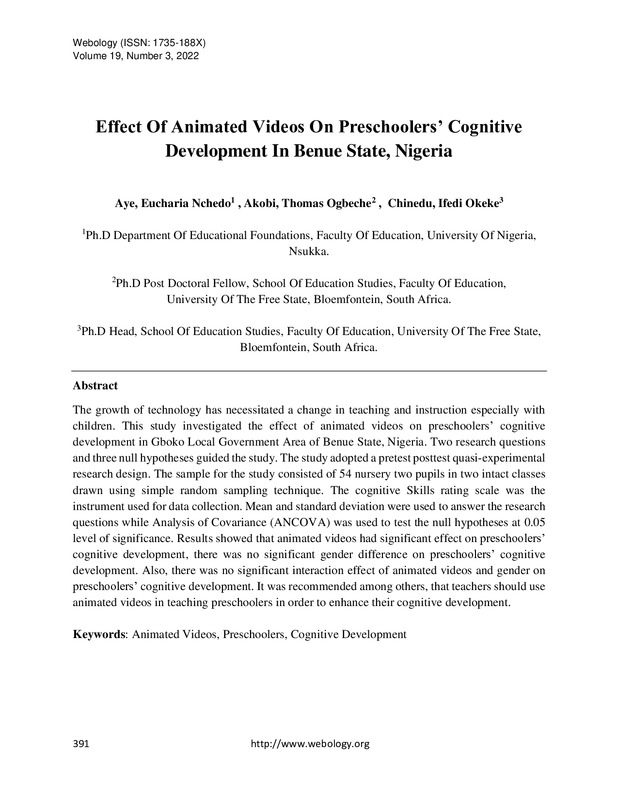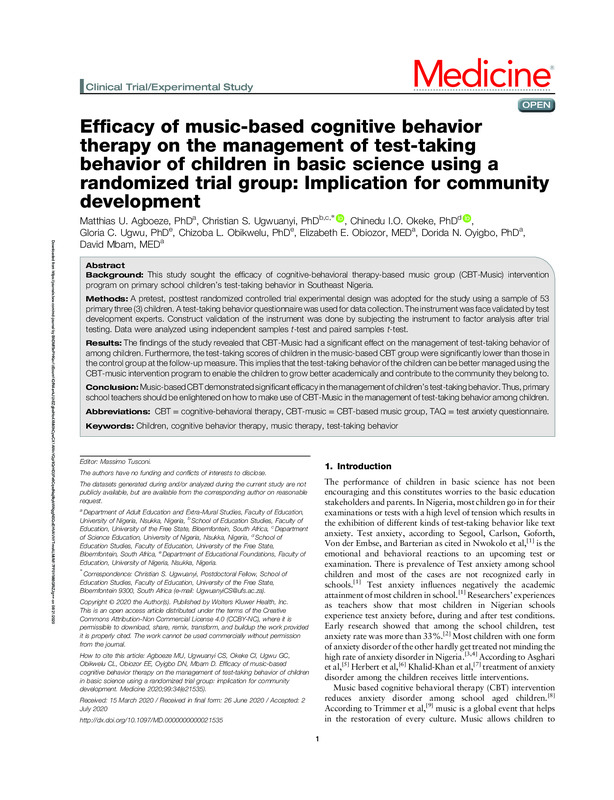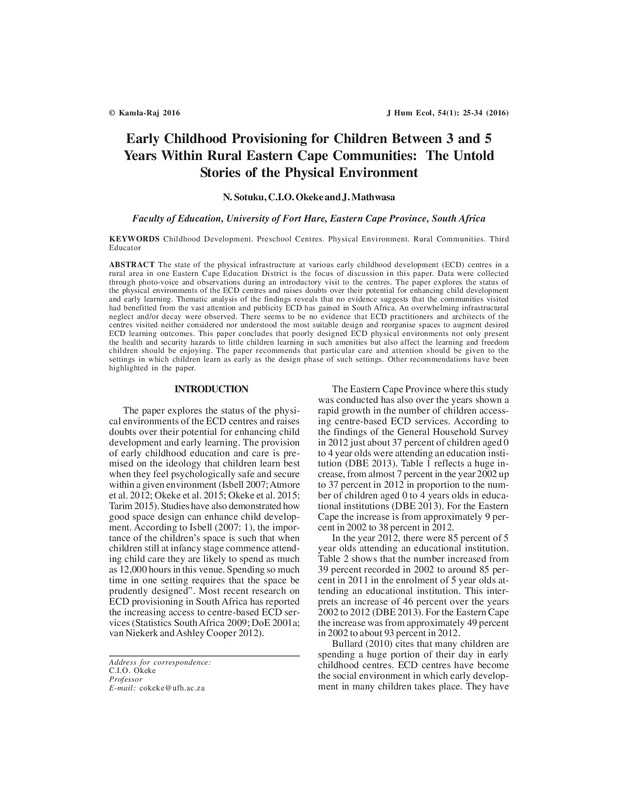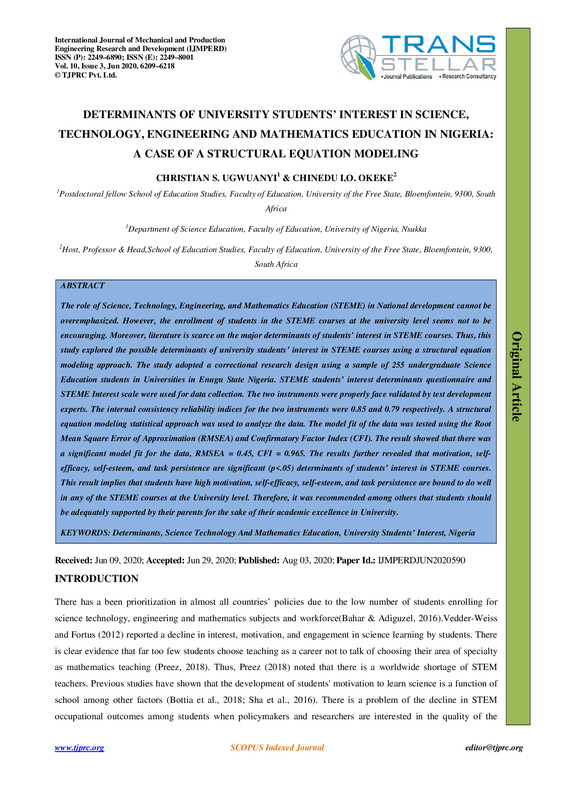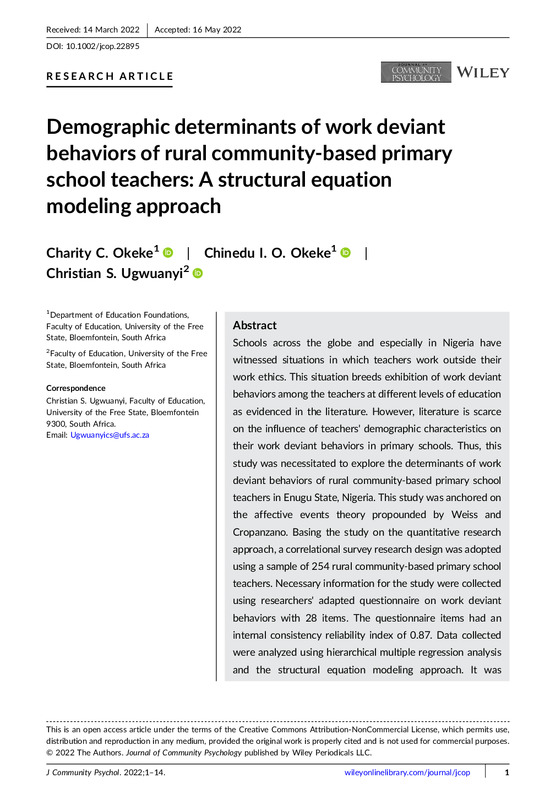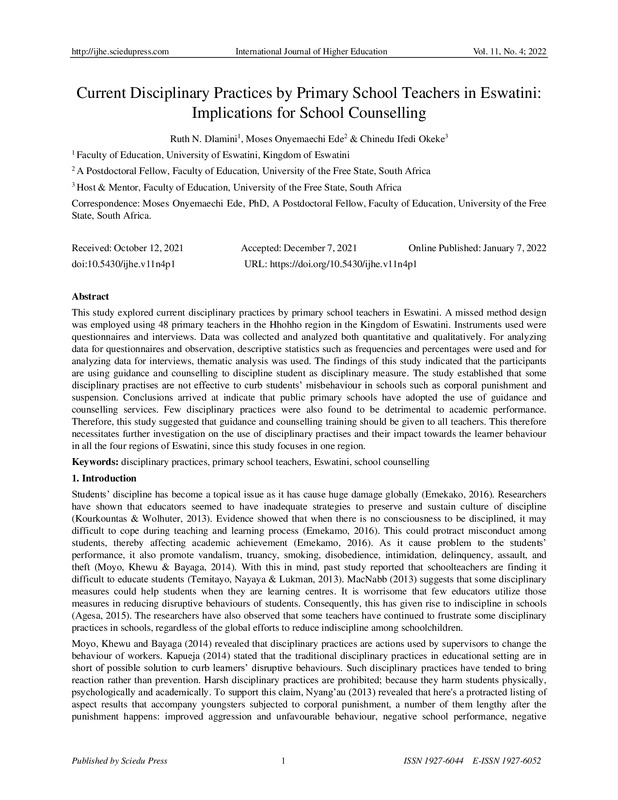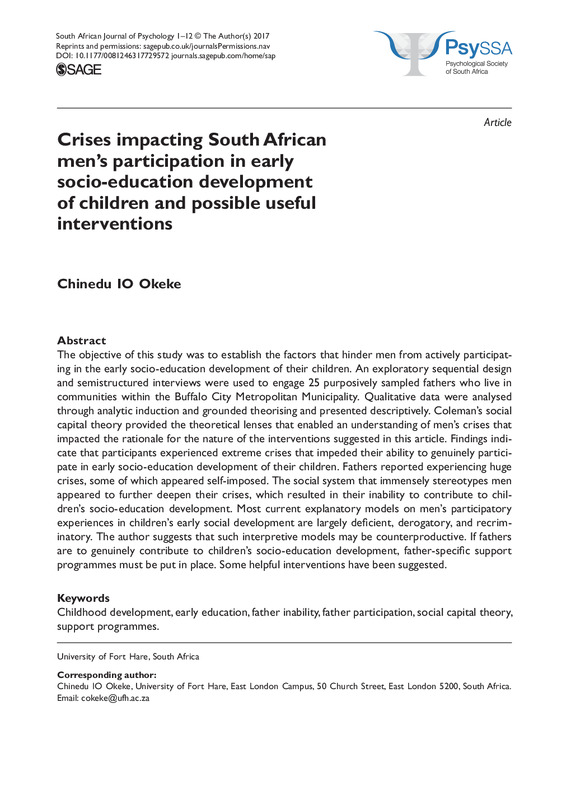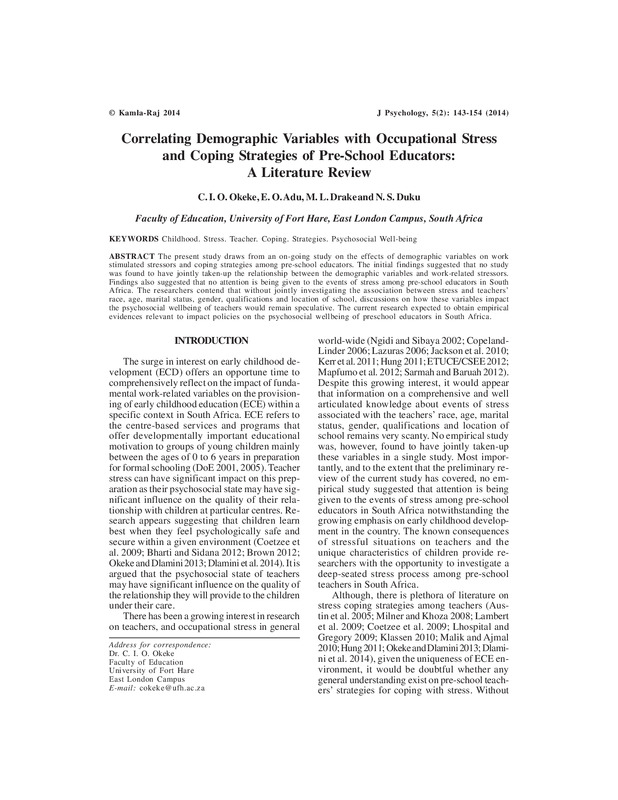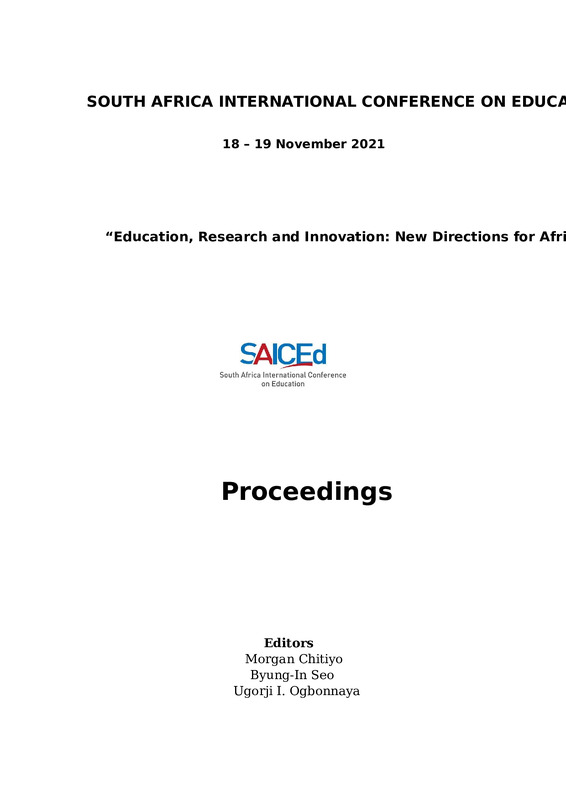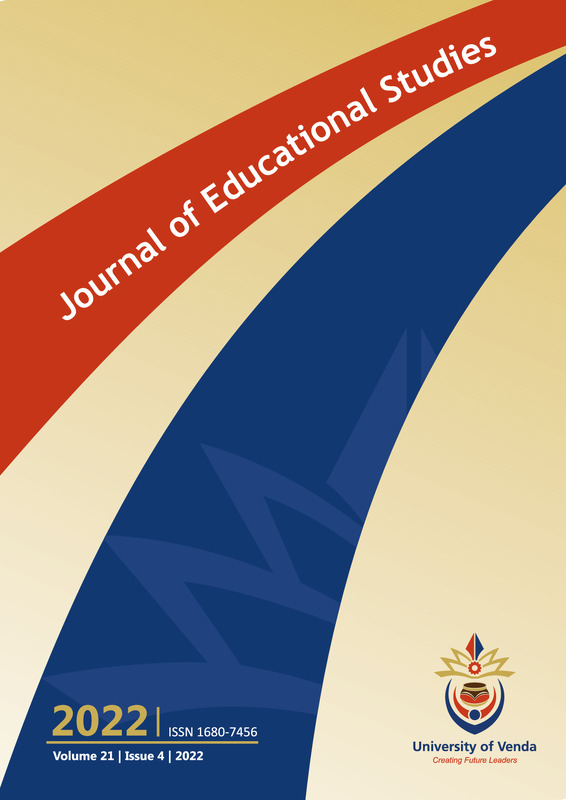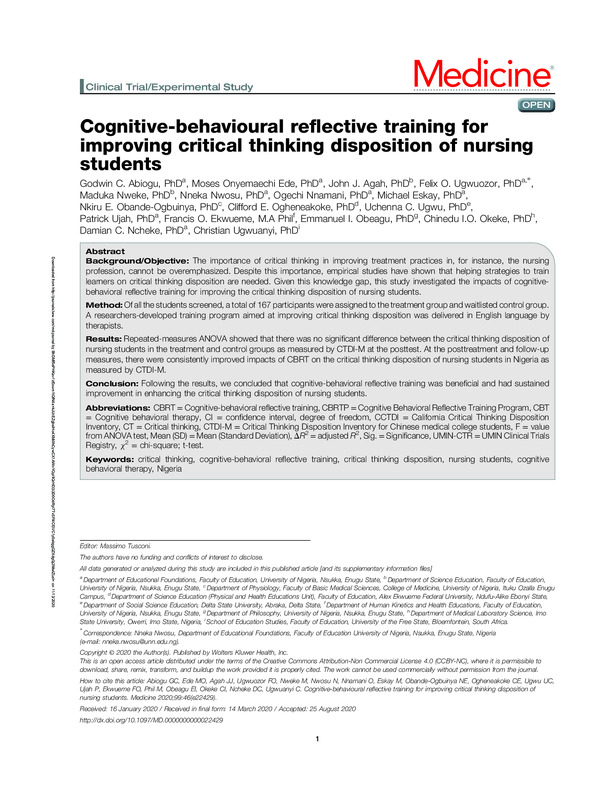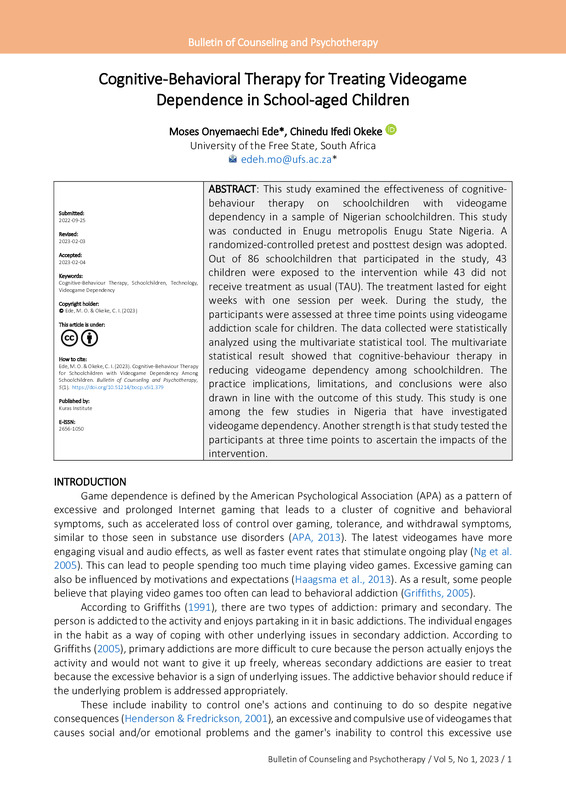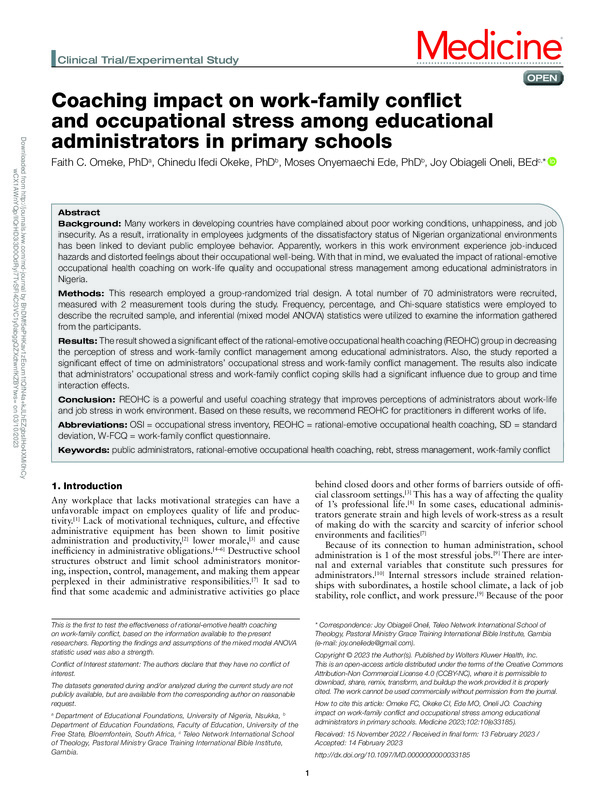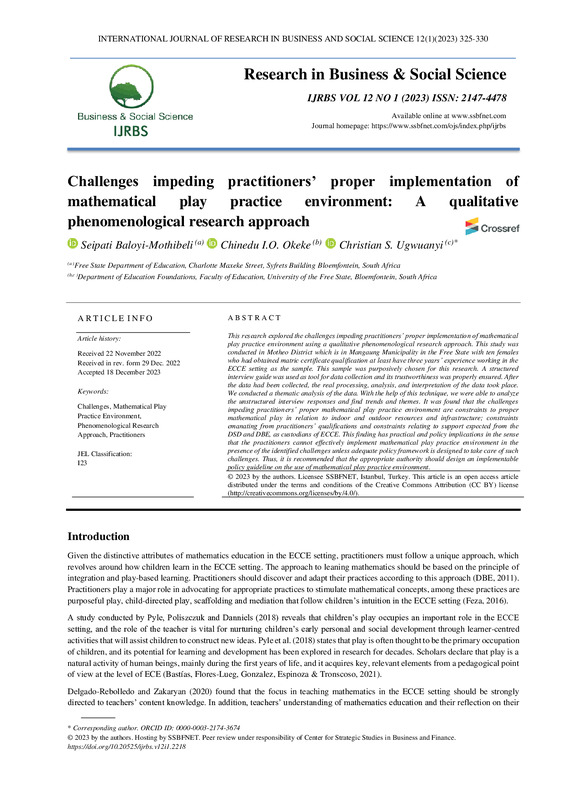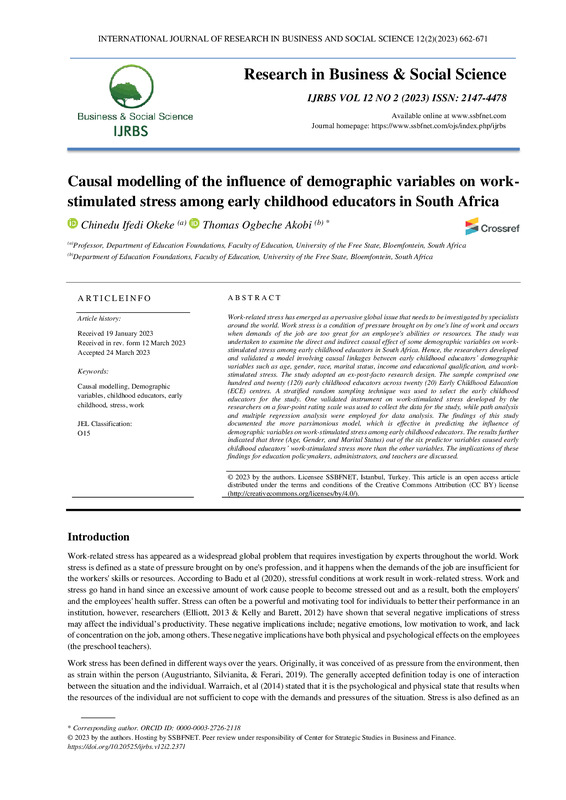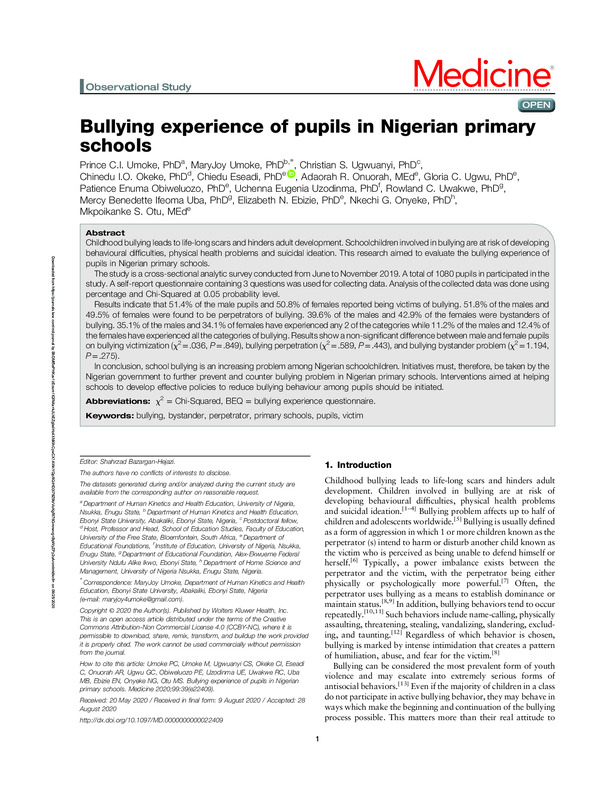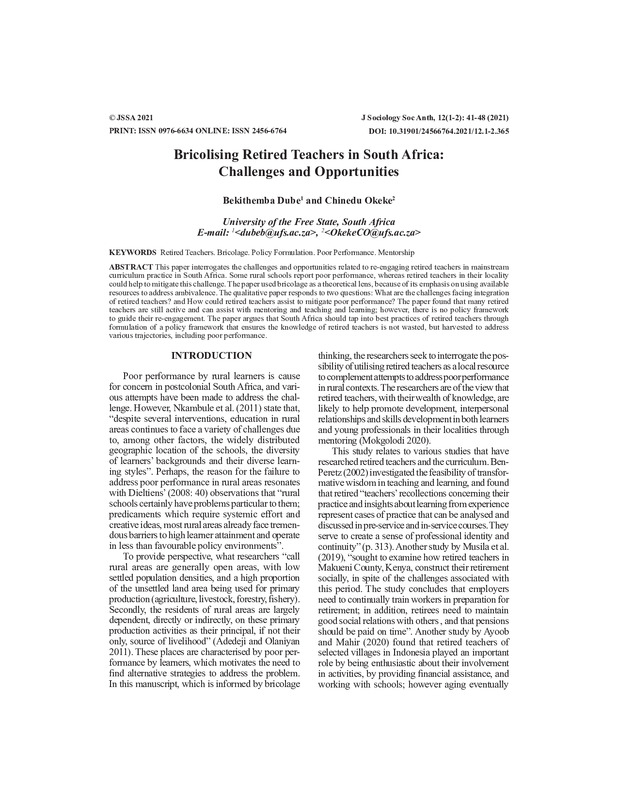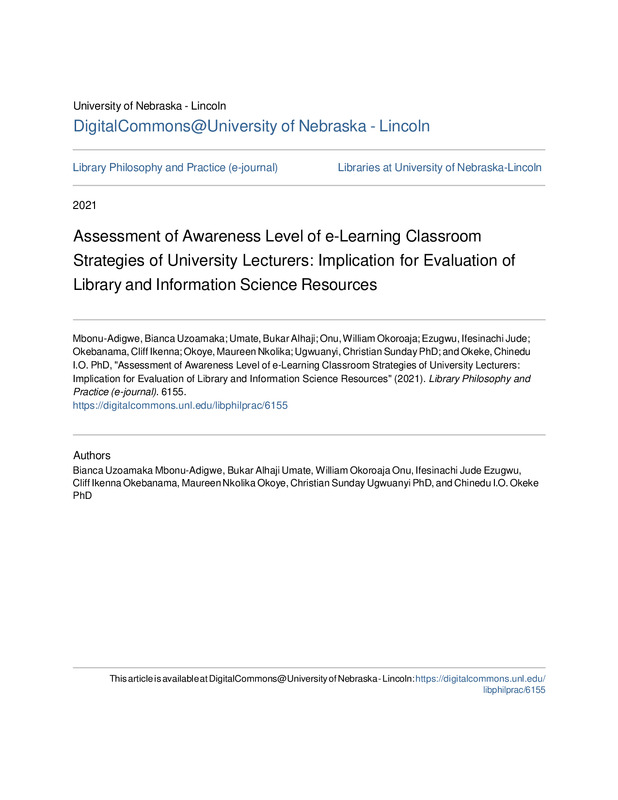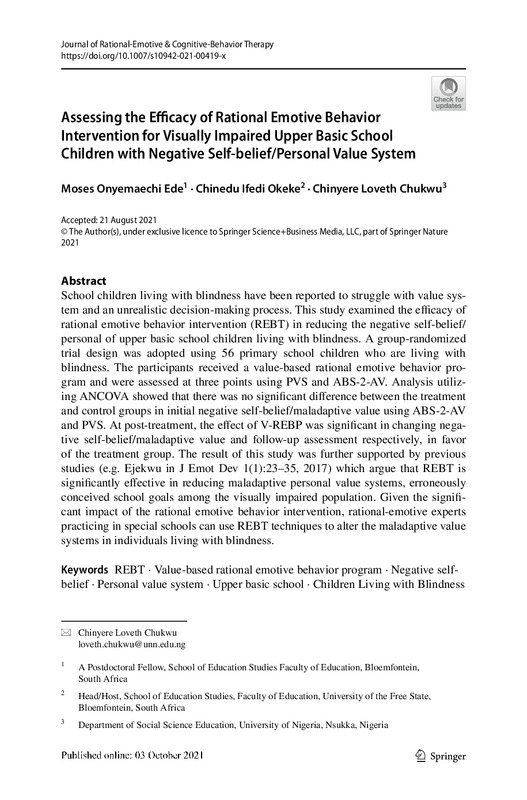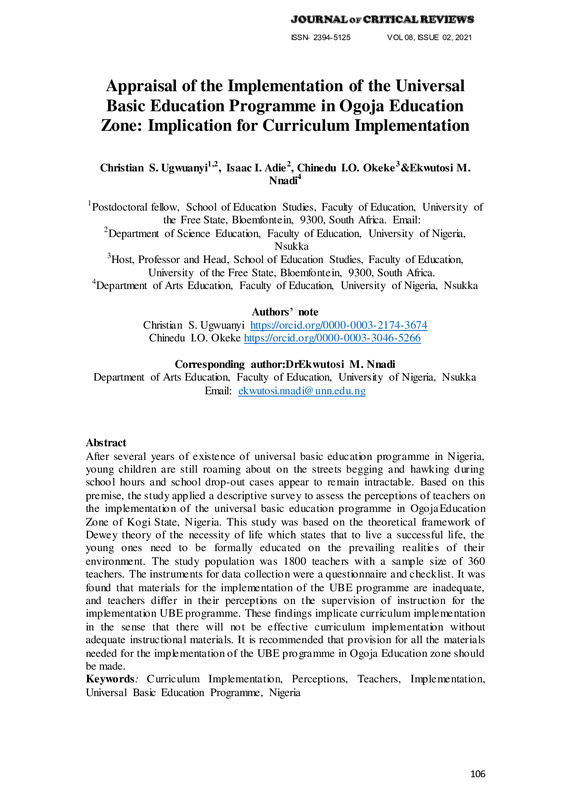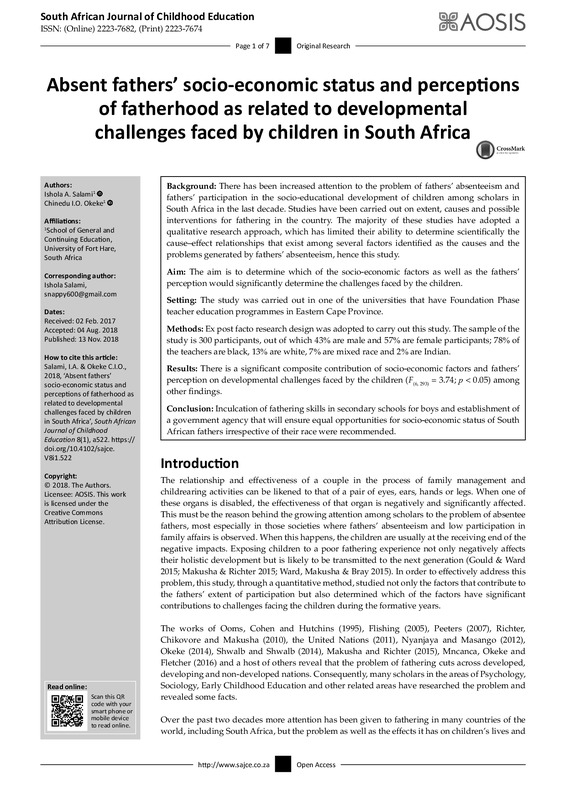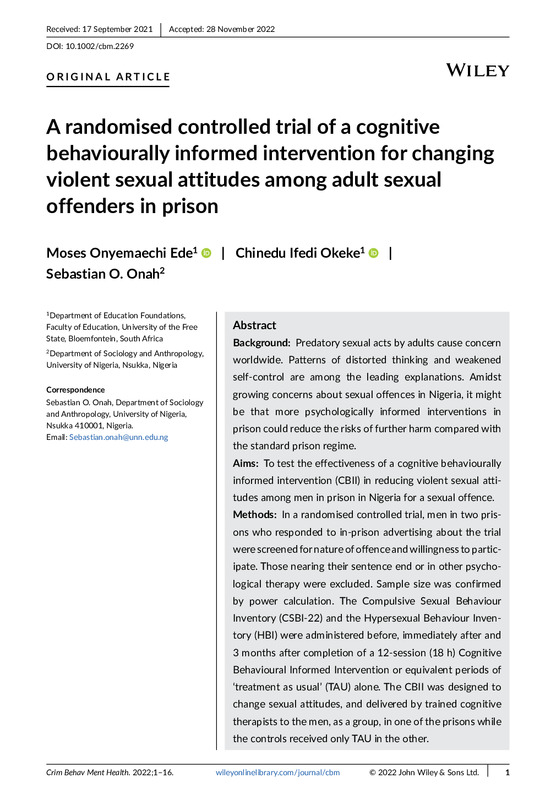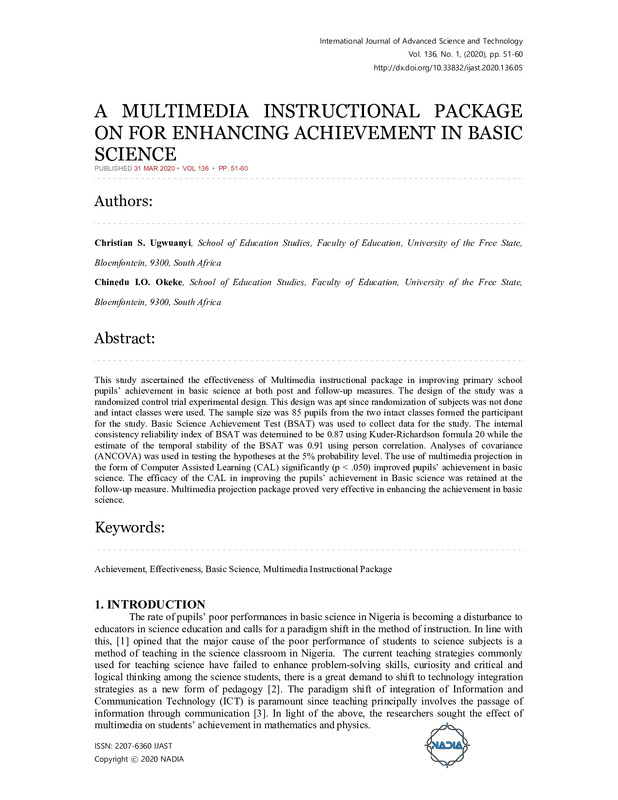Item set
Journal Articles
- Title
- Journal Articles
Items
-
ItemParents’ socio-economic status as a predictor of children’s Self-concept in Nsukka, Enugu State, Nigeria.This study was carried out to determine the relationship between parents’ socio-economic status and their primary school children’s self-concept. Threeresearchquestions and three null hypotheses guided the study. The work is basedonhumanistic learning theory by Carle Rogers. A correlational research designwasadopted for the study. The entire population of 845 was used as a sample, becausethe number was manageable. The instrument for data collection was a researcher-developed questionnaire called the Parental Socio-Economic Status and Children'sSelf-concept Questionnaire (PSESCSCQ). The instrument was validated by expertsbefore being administered to respondents. For data collection, a direct deliveryandretrieval method was adopted by the researchers, who were aided by fiveresearchassistants. Answers to the research questions were obtained by performingPearsonproduct moment correlation analysis. The hypotheses were tested using regressionanalysis (regression ANOVA). Data on parents’ socio-economic attributeswerecoded using dummy coding, which became necessary to bring the data tothesamemeasurement level. The results of the study show that all the attributes of parents’ socio-economic status (i.e., educational qualification, occupation, and income) aresignificant determinants of primary school children’s self-concept. It is concludedthat parents’ socio-economic status can significantly predict children’s self-concept. Oneof the recommendations is that parents should provide their children with anenablingenvironment to develop a positive self-concept, even if the parents have a lowsocio-economic status.
-
ItemEffect of animated videos on preschoolers’ cognitive development in Benue State, Nigeria.The growth of technology has necessitated a change in teaching and instruction especially with children. This study investigated the effect of animated videos on preschoolers’ cognitive development in Gboko Local Government Area of Benue State, Nigeria. Two research questions and three null hypotheses guided the study. The study adopted a pretest posttest quasi-experimental research design. The sample for the study consisted of 54 nursery two pupils in two intact classes drawn using simple random sampling technique. The cognitive Skills rating scale was the instrument used for data collection. Mean and standard deviation were used to answer the research questions while Analysis of Covariance (ANCOVA) was used to test the null hypotheses at 0.05 level of significance. Results showed that animated videos had significant effect on preschoolers’ cognitive development, there was no significant gender difference on preschoolers’ cognitive development. Also, there was no significant interaction effect of animated videos and gender on preschoolers’ cognitive development. It was recommended among others, that teachers should use animated videos in teaching preschoolers in order to enhance their cognitive development.
-
ItemEfficacy of music-based cognitive behavior therapy on the management of test-taking behavior of children in basic science using a randomized trial group: Implication for community development.Background: This study sought the efficacy of cognitive-behavioral therapy-based music group (CBT-Music) intervention program on primary school children’s test-taking behavior in Southeast Nigeria. Methods: A pretest, posttest randomized controlled trial experimental design was adopted for the study using a sample of 53 primary three (3) children. A test-taking behavior questionnaire was used for data collection. The instrument was face validated by test development experts. Construct validation of the instrument was done by subjecting the instrument to factor analysis after trial testing. Data were analyzed using independent samples t-test and paired samples t-test. Results: The findings of the study revealed that CBT-Music had a significant effect on the management of test-taking behavior of among children. Furthermore, the test-taking scores of children in the music-based CBT group were significantly lower than those in the control group at the follow-up measure. This implies that the test-taking behavior of the children can be better managed using the CBT-music intervention program to enable the children to grow better academically and contribute to the community they belong to. Conclusion: Music-basedCBT demonstrated significant efficacy in the management of children’s test-taking behavior. Thus, primary school teachers should be enlightened on how to make use of CBT-Music in the management of test-taking behavior among children. Abbreviations: CBT = cognitive-behavioral therapy, CBT-music = CBT-based music group, TAQ = test anxiety questionnaire.
-
ItemEarly childhood provisioning for children between 3 to 5 years within rural Eastern Cape Communities: The untold stories of the physical environment.The state of the physical infrastructure at various early childhood development (ECD) centres in a rural area in one Eastern Cape Education District is the focus of discussion in this paper. Data were collected through photo-voice and observations during an introductory visit to the centres. The paper explores the status of the physical environments of the ECD centres and raises doubts over their potential for enhancing child development and early learning. Thematic analysis of the findings reveals that no evidence suggests that the communities visited had benefitted from the vast attention and publicity ECD has gained in South Africa. An overwhelming infrastructural neglect and/or decay were observed. There seems to be no evidence that ECD practitioners and architects of the centres visited neither considered nor understood the most suitable design and reorganise spaces to augment desired ECD learning outcomes. This paper concludes that poorly designed ECD physical environments not only present the health and security hazards to little children learning in such amenities but also affect the learning and freedom children should be enjoying. The paper recommends that particular care and attention should be given to the settings in which children learn as early as the design phase of such settings. Other recommendations have been highlighted in the paper.
-
ItemDeterminants of University students’ interest in Science, Technology, Engineering and Mathematics Education in Nigeria: A case of a structural equation modelling.The role of Science, Technology, Engineering, and Mathematics Education (STEME) in National development cannot be overemphasized. However, the enrollment of students in the STEME courses at the university level seems not to be encouraging. Moreover, literature is scarce on the major determinants of students' interest in STEME courses. Thus, this study explored the possible determinants of university students’ interest in STEME courses using a structural equation modeling approach. The study adopted a correctional research design using a sample of 255 undergraduate Science Education students in Universities in Enugu State Nigeria. STEME students’ interest determinants questionnaire and STEME Interest scale were used for data collection. The two instruments were properly face validated by test development experts. The internal consistency reliability indices for the two instruments were 0.85 and 0.79 respectively. A structural equation modeling statistical approach was used to analyze the data. The model fit of the data was tested using the Root Mean Square Error of Approximation (RMSEA) and Confirmatory Factor Index (CFI). The result showed that there was a significant model fit for the data, RMSEA = 0.45, CFI = 0.965. The results further revealed that motivation, selfefficacy, self-esteem, and task persistence are significant (p<.05) determinants of students’ interest in STEME courses. This result implies that students have high motivation, self-efficacy, self-esteem, and task persistence are bound to do well in any of the STEME courses at the University level. Therefore, it was recommended among others that students should be adequately supported by their parents for the sake of their academic excellence in University.
-
ItemDemographic determinants of work deviant behaviors of rural community‐based primary school teachers: A structural equation modeling approach.Schools across the globe and especially in Nigeria have witnessed situations in which teachers work outside their work ethics. This situation breeds exhibition of work deviant behaviors among the teachers at different levels of education as evidenced in the literature. However, literature is scarce on the influence of teachers' demographic characteristics on their work deviant behaviors in primary schools. Thus, this study was necessitated to explore the determinants of work deviant behaviors of rural community‐based primary school teachers in Enugu State, Nigeria. This study was anchored on the affective events theory propounded by Weiss and Cropanzano. Basing the study on the quantitative research approach, a correlational survey research design was adopted using a sample of 254 rural community‐based primary school teachers. Necessary information for the study were collected using researchers' adapted questionnaire on work deviant behaviors with 28 items. The questionnaire items had an internal consistency reliability index of 0.87. Data collected were analyzed using hierarchical multiple regression analysis and the structural equation modeling approach. It was revealed that among the demographic characteristics (age, working status, qualification, marital status, gender, years of teaching experience, and location) of the teachers, only age and qualification were found to be significantly (p < 0.05) related to work deviant behaviors. The implication of this study, therefore, is that the age and qualification of rural community‐based primary school teachers determine the nature of their work deviant behaviors. Thus, it was recommended that the age and qualification of teachers should be considered very paramount in the employment of teachers.
-
ItemCurrent Disciplinary Practices by Primary School Teachers in Eswatini: Implications for School CounsellingThis study explored current disciplinary practices by primary school teachers in Eswatini. A missed method design was employed using 48 primary teachers in the Hhohho region in the Kingdom of Eswatini. Instruments used were questionnaires and interviews. Data was collected and analyzed both quantitative and qualitatively. For analyzing data for questionnaires and observation, descriptive statistics such as frequencies and percentages were used and for analyzing data for interviews, thematic analysis was used. The findings of this study indicated that the participants are using guidance and counselling to discipline student as disciplinary measure. The study established that some disciplinary practises are not effective to curb students’ misbehaviour in schools such as corporal punishment and suspension. Conclusions arrived at indicate that public primary schools have adopted the use of guidance and counselling services. Few disciplinary practices were also found to be detrimental to academic performance. Therefore, this study suggested that guidance and counselling training should be given to all teachers. This therefore necessitates further investigation on the use of disciplinary practises and their impact towards the learner behaviour in all the four regions of Eswatini, since this study focuses in one region.
-
ItemCrises impacting South African men’s participation in early socio-education development of children and possible useful interventions.The objective of this study was to establish the factors that hinder men from actively participating in the early socio-education development of their children. An exploratory sequential design and semistructured interviews were used to engage 25 purposively sampled fathers who live in through analytic induction and grounded theorising and presented descriptively. Coleman’s social capital theory provided the theoretical lenses that enabled an understanding of men’s crises that impacted the rationale for the nature of the interventions suggested in this article. Findings indicate that participants experienced extreme crises that impeded their ability to genuinely participate in early socio-education development of their children. Fathers reported experiencing huge crises, some of which appeared self-imposed. The social system that immensely stereotypes men appeared to further deepen their crises, which resulted in their inability to contribute to children’s socio-education development. Most current explanatory models on men’s participatory experiences in children’s early social development are largely deficient, derogatory, and recriminatory. The author suggests that such interpretive models may be counterproductive. If fathers are to genuinely contribute to children’s socio-education development, father-specific support programmes must be put in place. Some helpful interventions have been suggested.
-
ItemCorrelating demographic variables with occupational stress and coping strategies of pre-school educators: A literature review.The present study draws from an on-going study on the effects of demographic variables on work stimulated stressors and coping strategies among pre-school educators. The initial findings suggested that no study was found to have jointly taken-up the relationship between the demographic variables and work-related stressors. Findings also suggested that no attention is being given to the events of stress among pre-school educators in South Africa. The researchers contend that without jointly investigating the association between stress and teachers’ race, age, marital status, gender, qualifications and location of school, discussions on how these variables impact the psychosocial wellbeing of teachers would remain speculative. The current research expected to obtain empirical evidences relevant to impact policies on the psychosocial wellbeing of preschool educators in South Africa.
-
ItemConstraints inhibiting Zimbabwean parents’ active involvement in their children’s preschool education in the Bubi district.Poor paternal participation in parenting children aged 0 to 6 has been demonstrated in considerable studies. Such absence of paternal roles during the early development could adversely affect general development of the children at later years. Given these reasons, this study explored the constraints inhibiting Zimbabwean parents’ active involvement in their children’s preschool education in the Bubi district of Zimbabwe. The study is based on the principles of interconnectedness within settings and the linkages between settings that affect individual development. The study focused on the immediate, being the microsystems. The interpretive paradigm and the qualitative approach were employed to explore the constraints inhibiting Zimbabwean parents’ active involvement in their children’s preschool education in the Bubi District. Purposive sampling was used to select a small sample of two Heads of schools, four Early Childhood Development teachers and sixteen parents; these were from two schools in the Bubi district of Matabeleland, North Province of Zimbabwe. The results showed that low socio-economic factors, lack of awareness, values and attitude among others are attributed to non-participation of fathers in the development of zero to six aged children. We therefore recommend that there should be provision of statutory instruments that clearly state the role of the parents.
-
ItemConceptual analysis of the implications of black fathers’ lifestyles and their involvement in their children’s early development.A conceptual map of fathers’ lifestyles is adapted to provide an interconnected network of fathers’ lifestyles derived from social capital theory. The study explored fathers’ lifestyles and their impact on their children’s early development. The impact of lifestyle factors resulting from behaviour patterns like alcohol misuse, multiple partners, domestic violence, and absence from home among others, on South African fathers require extensive research to provide empirical evidence that may lead to meaningful interventions for affected fathers. The researcher’s university approved this study, and all ethical considerations were strictly adhered to. This was an exploratory multiple case study of 25 Black fathers who were purposively selected from a suburb in one rural Eastern Cape municipality in South Africa. Semi-structured in-depth interviews were used to obtain data, which was analysed thematically. Findings identified and provided evidence of father lifestyles that are incongruent with the kind of parental behaviour needed to support the healthy early development of children. Findings suggest that these negative lifestyles appear to incapacitate fathers, who fail to make a positive contribution to their children’s early development. To ensure that fathers make the expected contributions to their children’s early development, policies aiming to rehabilitate fathers who are involved in negative lifestyles should be put in place, while strategies to check proper implementation established.
-
ItemCognitive-behavioural reflective training for improving critical thinking disposition of nursing students.Background/Objective: The importance of critical thinking in improving treatment practices in, for instance, the nursing profession, cannot be overemphasized. Despite this importance, empirical studies have shown that helping strategies to train learners on critical thinking disposition are needed. Given this knowledge gap, this study investigated the impacts of cognitivebehavioral reflective training for improving the critical thinking disposition of nursing students. Method: Of all the students screened, a total of 167 participants were assigned to the treatment group and waitlisted control group. A researchers-developed training program aimed at improving critical thinking disposition was delivered in English language by therapists. Results: Repeated-measures ANOVA showed that there was no significant difference between the critical thinking disposition of nursing students in the treatment and control groups as measured by CTDI-M at the posttest. At the posttreatment and follow-up measures, there were consistently improved impacts of CBRT on the critical thinking disposition of nursing students in Nigeria as measured by CTDI-M. Conclusion: Following the results, we concluded that cognitive-behavioral reflective training was beneficial and had sustained improvement in enhancing the critical thinking disposition of nursing students. Abbreviations: CBRT = Cognitive-behavioral reflective training, CBRTP = Cognitive Behavioral Reflective Training Program, CBT = Cognitive behavioral therapy, CI = confidence interval, degree of freedom, CCTDI = California Critical Thinking Disposition Inventory, CT = Critical thinking, CTDI-M = Critical Thinking Disposition Inventory for Chinese medical college students, F = value from ANOVA test, Mean (SD) = Mean (Standard Deviation), DR2 = adjusted R2, Sig. = Significance, UMIN-CTR = UMIN Clinical Trials Registry, x2 = chi-square; t-test.
-
ItemCognitive-behavioral therapy for treating videogame dependence in school-aged childrenABSTRACT: This study examined the effectiveness of cognitivebehaviour therapy on schoolchildren with videogame dependency in a sample of Nigerian schoolchildren. This study was conducted in Enugu metropolis Enugu State Nigeria. A randomized-controlled pretest and posttest design was adopted. Out of 86 schoolchildren that participated in the study, 43 children were exposed to the intervention while 43 did not receive treatment as usual (TAU). The treatment lasted for eight weeks with one session per week. During the study, the participants were assessed at three time points using videogame addiction scale for children. The data collected were statistically analyzed using the multivariate statistical tool. The multivariate statistical result showed that cognitive-behaviour therapy in reducing videogame dependency among schoolchildren. The practice implications, limitations, and conclusions were also drawn in line with the outcome of this study. This study is one among the few studies in Nigeria that have investigated videogame dependency. Another strength is that study tested the participants at three time points to ascertain the impacts of the intervention.
-
ItemCoaching impact on work-family conflict and occupational stress among educational administrators in primary schools.Background: Many workers in developing countries have complained about poor working conditions, unhappiness, and job insecurity. As a result, irrationality in employees judgments of the dissatisfactory status of Nigerian organizational environments has been linked to deviant public employee behavior. Apparently, workers in this work environment experience job-induced hazards and distorted feelings about their occupational well-being. With that in mind, we evaluated the impact of rational-emotive occupational health coaching on work-life quality and occupational stress management among educational administrators in Nigeria. Methods: This research employed a group-randomized trial design. A total number of 70 administrators were recruited, measured with 2 measurement tools during the study. Frequency, percentage, and Chi-square statistics were employed to describe the recruited sample, and inferential (mixed model ANOVA) statistics were utilized to examine the information gathered from the participants. Results: The result showed a significant effect of the rational-emotive occupational health coaching (REOHC) group in decreasing the perception of stress and work-family conflict management among educational administrators. Also, the study reported a significant effect of time on administrators’ occupational stress and work-family conflict management. The results also indicate that administrators’ occupational stress and work-family conflict coping skills had a significant influence due to group and time interaction effects. Conclusion: REOHC is a powerful and useful coaching strategy that improves perceptions of administrators about work-life and job stress in work environment. Based on these results, we recommend REOHC for practitioners in different works of life. Abbreviations: OSI = occupational stress inventory, REOHC = rational-emotive occupational health coaching, SD = standard deviation, W-FCQ = work-family conflict questionnaire.
-
ItemChallenges impeding practitioners’ proper implementation of mathematical play practice environment: A qualitative phenomenological research approach.This research explored the challenges impeding practitioners’ proper implementation of mathematical play practice environment using a qualitative phenomenological research approach. This study was conducted in Motheo District which is in Mangaung Municipality in the Free State with ten females who had obtained matric certificate qualification at least have three years’ experience working in the ECCE setting as the sample. This sample was purposively chosen for this research. A structured interview guide was used as tool for data collection and its trustworthiness was properly ensured. After the data had been collected, the real processing, analysis, and interpretation of the data took place. We conducted a thematic analysis of the data. With the help of this technique, we were able to analyze the unstructured interview responses and find trends and themes. It was found that the challenges impeding practitioners’ proper mathematical play practice environment are constraints to proper mathematical play in relation to indoor and outdoor resources and infrastructure; constraints emanating from practitioners’ qualifications and constraints relating t support expected from the DSD and DBE, as custodians of ECCE. This finding has practical and policy implications in the sense that the practitioners cannot effectively implement mathematical play practice environment in the presence of the identified challenges unless adequate policy framework is designed to take care of such challenges. Thus, it is recommended that the appropriate authority should design an implementable policy guideline on the use of mathematical play practice environment.
-
ItemCausal modelling of the influence of demographic variables on work-stimulated stress among early childhood educators in South Africa.Work-related stress has emerged as a pervasive global issue that needs to be investigated by specialists around the world. Work stress is a condition of pressure brought on by one's line of work and occurs when demands of the job are too great for an employee's abilities or resources. The study was undertaken to examine the direct and indirect causal effect of some demographic variables on workstimulated stress among early childhood educators in South Africa. Hence, the researchers developed and validated a model involving causal linkages between early childhood educators’ demographic variables such as age, gender, race, marital status, income and educational qualification, and workstimulated stress. The study adopted an ex-post-facto research design. The sample comprised one hundred and twenty (120) early childhood educators across twenty (20) Early Childhood Education (ECE) centres. A stratified random sampling technique was used to select the early childhood educators for the study. One validated instrument on work-stimulated stress developed by the researchers on a four-point rating scale was used to collect the data for the study, while path analysis and multiple regression analysis were employed for data analysis. The findings of this study documented the more parsimonious model, which is effective in predicting the influence of demographic variables on work-stimulated stress among early childhood educators. The results further indicated that three (Age, Gender, and Marital Status) out of the six predictor variables caused early childhood educators’ work-stimulated stress more than the other variables. The implications of these findings for education policymakers, administrators, and teachers are discussed.
-
ItemBullying experience of pupils in Nigerian primary schools.Abstract: Childhood bullying leads to life-long scars and hinders adult development. Schoolchildren involved in bullying are at risk of developing behavioural difficulties, physical health problems and suicidal ideation. This research aimed to evaluate the bullying experience of pupils in Nigerian primary schools. The study is a cross-sectional analytic survey conducted from June to November 2019. A total of 1080 pupils in participated in the study. A self-report questionnaire containing 3 questions was used for collecting data. Analysis of the collected data was done using percentage and Chi-Squared at 0.05 probability level. Results indicate that 51.4% of the male pupils and 50.8% of females reported being victims of bullying. 51.8% of the males and 49.5% of females were found to be perpetrators of bullying. 39.6% of the males and 42.9% of the females were bystanders of bullying. 35.1% of the males and 34.1% of females have experienced any 2 of the categories while 11.2% of the males and 12.4% of the females have experienced all the categories of bullying. Results show a non-significant difference between male and female pupils on bullying victimization (x2=.036, P=.849), bullying perpetration (x2=.589, P=.443), and bullying bystander problem (x2=1.194, P=.275). In conclusion, school bullying is an increasing problem among Nigerian schoolchildren. Initiatives must, therefore, be taken by the Nigerian government to further prevent and counter bullying problem in Nigerian primary schools. Interventions aimed at helping schools to develop effective policies to reduce bullying behaviour among pupils should be initiated. Abbreviations: x2 = Chi-Squared, BEQ = bullying experience questionnaire.
-
ItemBricolising retired teachers in South Africa: Challenges and opportunities.This paper interrogates the challenges and opportunities related to re-engaging retired teachers in mainstream curriculum practice in South Africa. Some rural schools report poor performance, whereas retired teachers in their locality could help to mitigate this challenge. The paper used bricolage as a theoretical lens, because of its emphasis on using available resources to address ambivalence. The qualitative paper responds to two questions: What are the challenges facing integration of retired teachers? and How could retired teachers assist to mitigate poor performance? The paper found that many retired teachers are still active and can assist with mentoring and teaching and learning; however, there is no policy framework to guide their re-engagement. The paper argues that South Africa should tap into best practices of retired teachers through formulation of a policy framework that ensures the knowledge of retired teachers is not wasted, but harvested to address various trajectories, including poor performance.
-
ItemAssessment of awareness level of e-learning classroom strategies of University lecturers: Implication for evaluation of library and information science resources.The emergence of information technology has brought a drastic change in the role of university libraries. University Libraries play key role in supporting e-learning implying that Library and information science personnel can significantly assist in the integration of information resources in the process of electronic learning. Thus, this study investigated lecturers’ level of awareness of e-learning classroom strategies. Descriptive survey design was adopted for the study. The sample comprised 149 lecturers teaching integrated science courses. Instrument used for data collection was a questionnaire titled Lecturers’ Awareness Level of E-learning Strategies (LALES). LALES was validated and the reliability index of the items was estimated at 0.897 using Cronbach’s Alpha method. The data collected were analyzed using mean and standard deviation to answer the research questions while the hypotheses were tested using ttest. Findings revealed among others, that the lecturers were partially aware of strategies to facilitate e-learning. Based on the findings, it was recommended among others that the Nigerian government should provide e-learning facilities through proper evaluation of Library and information science resources.
-
ItemAssessing the efficacy of rational emotive behavior intervention for visually impaired upper basic school children with negative self‑belief/personal value system.School children living with blindness have been reported to struggle with value system and an unrealistic decision-making process. This study examined the efficacy of rational emotive behavior intervention (REBT) in reducing the negative self-belief/personal of upper basic school children living with blindness. A group-randomized trial design was adopted using 56 primary school children who are living with blindness. The participants received a value-based rational emotive behavior program and were assessed at three points using PVS and ABS-2-AV. Analysis utilizing ANCOVA showed that there was no signifcant diference between the treatment and control groups in initial negative self-belief/maladaptive value using ABS-2-AV and PVS. At post-treatment, the efect of V-REBP was signifIcant in changing negative self-belief/maladaptive value and follow-up assessment respectively, in favor of the treatment group. The result of this study was further supported by previous studies (e.g. Ejekwu in J Emot Dev 1(1):23–35, 2017) which argue that REBT is signifcantly efective in reducing maladaptive personal value systems, erroneously conceived school goals among the visually impaired population. Given the signifcant impact of the rational emotive behavior intervention, rational-emotive experts practicing in special schools can use REBT techniques to alter the maladaptive value systems in individuals living with blindness.
-
ItemAppraisal of the implementation of the universal basic education programme in Ogoja Education Zone: Implication for curriculum implementation.After several years of existence of universal basic education programme in Nigeria, young children are still roaming about on the streets begging and hawking during school hours and school drop-out cases appear to remain intractable. Based on this premise, the study applied a descriptive survey to assess the perceptions of teachers on the implementation of the universal basic education programme in Ogoja Education Zone of Kogi State, Nigeria. This study was based on the theoretical framework of Dewey theory of the necessity of life which states that to live a successful life, the young ones need to be formally educated on the prevailing realities of their environment. The study population was 1800 teachers with a sample size of 360 teachers. The instruments for data collection were a questionnaire and checklist. It was found that materials for the implementation of the UBE programme are inadequate,and teachers differ in their perceptions on the supervision of instruction for the implementation UBE programme. These findings implicate curriculum implementation in the sense that there will not be effective curriculum implementation without adequate instructional materials. It is recommended that provision for all the materials needed for the implementation of the UBE programme in Ogoja Education zone should be made.
-
ItemAbsent fathers’ socio-economic status and perceptions of fatherhood as related to developmental challenges faced by children in South AfricaBackground: There has been increased attention to the problem of fathers’ absenteeism and fathers’ participation in the socio-educational development of children among scholars in South Africa in the last decade. Studies have been carried out on extent, causes and possible interventions for fathering in the country. The majority of these studies have adopted a qualitative research approach, which has limited their ability to determine scientifically the cause–effect relationships that exist among several factors identified as the causes and the problems generated by fathers’ absenteeism, hence this study. Aim: The aim is to determine which of the socio-economic factors as well as the fathers’ perception would significantly determine the challenges faced by the children. Setting: The study was carried out in one of the universities that have Foundation Phase teacher education programmes in Eastern Cape Province. Methods: Ex post facto research design was adopted to carry out this study. The sample of the study is 300 participants, out of which 43% are male and 57% are female participants; 78% of the teachers are black, 13% are white, 7% are mixed race and 2% are Indian. Results: There is a significant composite contribution of socio-economic factors and fathers’ perception on developmental challenges faced by the children (F(6, 293) = 3.74; p < 0.05) among other findings. Conclusion: Inculcation of fathering skills in secondary schools for boys and establishment of a government agency that will ensure equal opportunities for socio-economic status of South African fathers irrespective of their race were recommended.
-
ItemA randomised controlled trial of a cognitive behaviourally informed intervention for changing violent sexual attitudes among adult sexual offenders in prison.Background: Predatory sexual acts by adults cause concern worldwide. Patterns of distorted thinking and weakened self-control are among the leading explanations. Amidst growing concerns about sexual offences in Nigeria, it might be that more psychologically informed interventions in prison could reduce the risks of further harm compared with the standard prison regime. Aims: To test the effectiveness of a cognitive behaviourally informed intervention (CBII) in reducing violent sexual attitudes among men in prison in Nigeria for a sexual offence. Methods: In a randomised controlled trial, men in two prisons who responded to in-prison advertising about the trial were screened for nature of offence and willingness to participate. Those nearing their sentence end or in other psychological therapy were excluded. Sample size was confirmed by power calculation. The Compulsive Sexual Behaviour Inventory (CSBI-22) and the Hypersexual Behaviour Inventory (HBI) were administered before, immediately after and 3 months after completion of a 12-session (18 h) Cognitive Behavioural Informed Intervention or equivalent periods of ‘treatment as usual’ (TAU) alone. The CBII was designed to change sexual attitudes, and delivered by trained cognitive therapists to the men, as a group, in one of the prisons while the controls received only TAU in the other. Results: Before the intervention, the 39 men in each group had similar psychosocial histories and sexual attitude scores. Following CBII, the intervention group showed a significant reduction in scale scores that was sustained, whereas the TAU group showed no significant change in scores. An ANCOVA analysis confirmed between-group differences immediately after the intervention and 3 months later. Conclusions: This randomised controlled trial adds to existing knowledge in the field because prior studies have been from high income countries, where interventions are generally delivered in more privacy and at greater length. Given that our study had to be limited to change in sexual attitudes as the main outcome, future research must focus on the extent to which such change maps on to changes in interpersonal behaviour among such men. If these findings can be extended in this way and replicated, this could pave the way for more cost-efficient interventions in higher income countries too.
-
ItemA Multimedia Instructional Package on for Enhancing Achievement in basic Science.This study ascertained the effectiveness of Multimedia instructional package in improving primary school pupils’ achievement in basic science at both post and follow-up measures. The design of the study was a randomized control trial experimental design. This design was apt since randomization of subjects was not done and intact classes were used. The sample size was 85 pupils from the two intact classes formed the participant for the study. Basic Science Achievement Test (BSAT) was used to collect data for the study. The internal consistency reliability index of BSAT was determined to be 0.87 using Kuder-Richardson formula 20 while the estimate of the temporal stability of the BSAT was 0.91 using person correlation. Analyses of covariance (ANCOVA) was used in testing the hypotheses at the 5% probability level. The use of multimedia projection in the form of Computer Assisted Learning (CAL) significantly (p < .050) improved pupils’ achievement in basic science. The efficacy of the CAL in improving the pupils’ achievement in Basic science was retained at the follow-up measure. Multimedia projection package proved very effective in enhancing the achievement in basic science.


